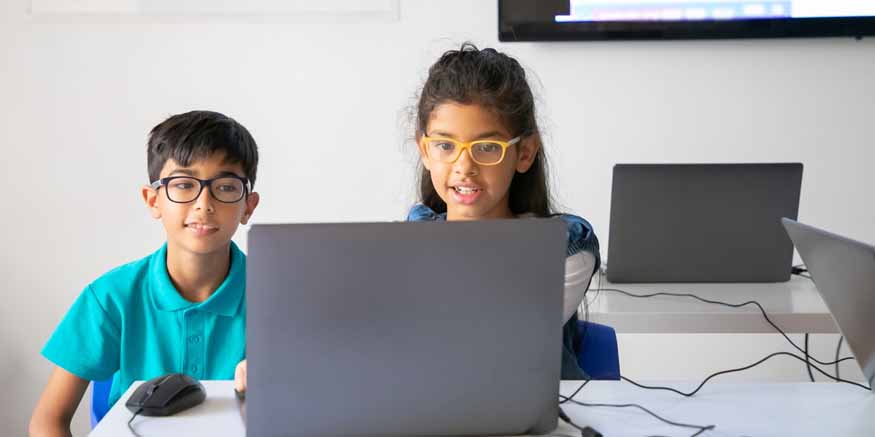The first day of school interview is an exciting yet nerve-wracking milestone in a child’s academic journey. Their enrollment in a new school depends on it, and it also prepares the road for their future academic achievement. To succeed, preparation is essential, and your child has to master tactics for improving confidence. We will delve into a range of effective tips for children for their first interview to help them crack their first school interview with ease, leaving a lasting impression on the interviewers and increasing their chances of securing admission.
Also Read: Age Limit for Admission in Class 1 in CBSE
- Research the School
- Practice Common Interview Questions
- Teach Good Communication Skills
- Encourage Self-Expression
- Promote Positive Body Language
- Instil the Importance of Manners
- Encourage Confidence and Positive Thinking
- Dress Appropriately
- Conduct Mock Interviews
- Stay Calm and Positive
Before the first day of school interview, it’s important to become familiar with the school your child is requesting an application from. Learn more about the school’s aims, guiding values, and instructional strategies by visiting its website. This knowledge will empower your child to demonstrate their genuine interest in the school and align their answers during the interview. They can highlight specific aspects of the school that appeal to them, showcasing their enthusiasm for becoming a part of the institution’s vibrant community.
Having your child practise typical first day of school interview questions is one of the best methods to get them ready for the interview. Learn more about these topics by taking some time. This approach not only helps them structure their responses but also allows them to showcase their unique qualities and demonstrate their suitability for the school. By rehearsing these questions together, you can provide guidance and feedback, helping your child refine their answers and build confidence in their ability to respond effectively during the interview.
Effective communication is key to making a positive impression during the interview. Make sure your youngster listens intently, speaks properly, and maintains eye contact. Teach them to speak their minds clearly and respectfully, avoiding too informal or slang language. Role-playing interview scenarios at home can significantly enhance their communication skills. Assume the role of the interviewer and simulate a mock interview, providing constructive feedback on their responses, body language, and overall performance. This activity allows your child to hone their communication skills in a safe setting while also getting them accustomed to the interview style. Stress the value of active listening by urging your child to pay close attention to the interviewers’ questions and give intelligent answers.
Interviewers value a child’s authentic self-expression. Encourage your child to share their thoughts, ideas, and aspirations during the interview. Remind them to be genuine and embrace their uniqueness. Assure them that interviewers want to know their personality and potential. Help them reflect on experiences and articulate their goals. This self-expression showcases effective communication and confidence. Practice storytelling techniques to present experiences and achievements compellingly. By encouraging self-expression, your child stands out and leaves a lasting impression on the interviewers.
Help your youngster sit straight, keep a decent posture, and refrain from fidgeting. Remind them to smile naturally and use appropriate hand gestures while speaking. Encourage them to maintain eye contact with the interviewers, as it conveys confidence and engagement. Your child’s ability to communicate nonverbally can be considerably improved by modelling healthy body language at home. support your kid to talk in front of a mirror and participate in activities that support excellent posture so they can see themselves and alter their body language. You may assist your youngster in expressing professionalism, confidence, and excitement by encouraging positive body language.
Also Read: IELTS Benefits: Meaning, Preparation, Practice, Test
A successful interview depends heavily on politeness and etiquette. Teach your youngster to provide a kind smile, a firm handshake (if appropriate), and a courteous greeting to the interviewers. Throughout the interview process, emphasise the value of using the words “please” and “thank you” to demonstrate respect and decency. Remind them to maintain a respectful and positive tone throughout the conversation. By instilling the importance of manners, you equip your child with the tools to create a positive impression and showcase their social skills during the interview.
Confidence is vital for interview success. Encourage positive thinking and highlight their potential. Emphasise that mistakes are opportunities to learn and advise them to remain calm throughout the interview. Create a supportive environment at home where they feel comfortable expressing themselves and sharing their aspirations. Encourage them to visualise a successful interview, instilling confidence in their abilities. Reinforce that their individuality and genuine enthusiasm will impress the interviewers. By fostering confidence and positive thinking, you empower your child to approach the interview with self-assurance and showcase their best self.
Choosing appropriate attire for the interview demonstrates respect for the process and the school. Help your child select neat and comfortable clothes that are suitable for the occasion. Avoid distracting accessories or excessive makeup. Simple and modest attire will help your child make a professional and presentable impression. Encourage them to pay attention to grooming, ensuring their hair is well-kempt and their attire is clean and wrinkle-free. By dressing appropriately, your child conveys their understanding of the interview’s significance and their commitment to making a positive impression.
Conducting mock interviews is an excellent way to simulate the interview experience and prepare your child effectively. Assume the role of the interviewer and create a realistic interview environment. Ask them a variety of questions, including both common interview questions and ones specific to the school they are applying to. Provide constructive feedback on their responses, body language, and overall performance. Encourage them to refine their answers, enhance their communication skills, and build confidence. Mock interviews allow your child to become familiar with the interview format, reduce anxiety, and fine-tune their interviewing techniques. By simulating different scenarios and offering guidance, you equip your child with the skills and readiness necessary to excel in the actual interview.
On the day of the interview, create a calm and positive environment for your child. Ensure they get enough rest the night before and have a healthy breakfast to fuel their energy. Keep them relaxed and motivated by offering positive affirmations and reminders of their unique qualities and capabilities. Assure them that you believe in their abilities and that they should approach the first day of school interview questions with a calm and positive mindset. Remind them that the interviewers are interested in getting to know each other.
Also Read: Competitive Exams After 10th: Which Board to Choose?
Conclusion
Cracking the first school interview is a significant milestone for your child. With proper preparation and tips for the child for the first interview, they can navigate the process with confidence. By researching the school, practising, improving communication skills, encouraging self-expression, demonstrating positive body language, emphasising manners, fostering confidence and positive thinking, dressing appropriately, conducting mock interviews, and maintaining a calm mindset, you equip your child to shine during their interview. With your support and their unique qualities, they are well-prepared to make a positive impact and increase their chances of securing admission.
Euroschool recognises the significance of a child’s first school interview and offers valuable insights to help them succeed. Their tips focus on preparing children through comprehensive research about the school, practising common interview questions, developing effective communication skills, encouraging self-expression, promoting positive body language, instilling good manners, fostering confidence and positive thinking, emphasising appropriate attire, conducting mock interviews, and maintaining a calm and positive mindset. By following EuroSchool’s expert advice, parents and children can approach the interview process with confidence, ensuring a higher likelihood of success and a positive experience for the child.









